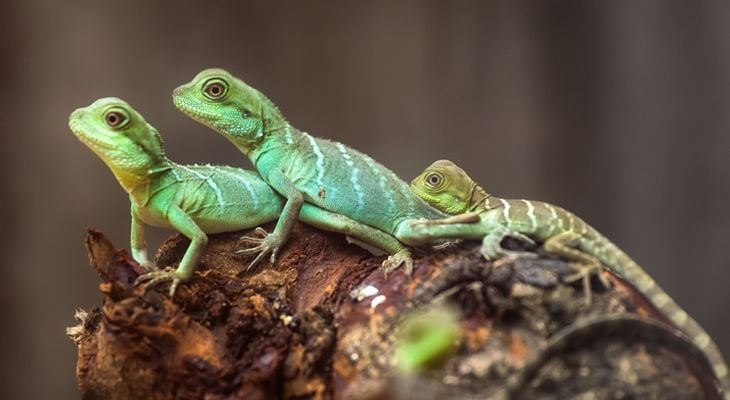Do you know what your dog's non-verbal signals mean?
Read more

People with limited living quarters may find that reptiles such as lizards or turtles fit perfectly into their lifestyles. Before deciding on a reptile, learn as much as possible about them and their needs. Poisonous snakes and certain reptiles should never be kept as pets. Ask your veterinarian about the suitability of a particular animal before you make your decision. There are many things to consider before committing to a reptile as a pet.
Finding out if a Pet is Legal Where You Live
Many areas have enacted laws pertaining to keeping reptiles. Some are general and some are quite specific; in many places any reptiles that are considered dangerous (venomous snakes, alligators, etc.) are illegal but some places are even more restrictive (for example, in some states all constricting snakes including ball pythons are illegal).
Salmonella Risks and Prevention
All reptile owners need to be informed about Salmonella infections. While the risks shouldn't keep most people from keeping reptiles since with the proper management the risks are minimal. Still, owners should be aware of the risks, and the US Centers for Disease Control recommends that certain risk groups should be careful about contact with reptiles and amphibians.
The Importance of Light and Heat
Many problems with keeping reptiles can be traced back to not providing the proper environmental conditions, particularly heat. Proper lighting is also important for many reptiles. The equipment to provide the proper heat and light to captive reptiles is often quite expensive, but is absolutely essential to keeping pet reptiles healthy. It is important to find out exactly what conditions your reptile needs and never cut corners when it comes to meeting those conditions!
Why Choose Captive Bred Reptiles
There are numerous reasons why you should pick a captive bred reptile if at all possible, as explained here.
How to Pick a Healthy Reptile
It is important to keep in mind that depending on where you get a reptile, it may be very stressed, dehydrated, and prone to illness. Here are some items to look for when buying your reptile to increase the chances of picking out a healthy pet reptile.
While there are many types of reptiles that could be good pets, here we cover a few you could consider.
-
What Your Dog’s Body Language Means
Category: Newsletter Library
-
Newts
Category: Choosing Your Pet, Exotics, Amphibians
Are you considering getting a pet newt? Newts may not be the most obvious choice for a pet, but as many veterinarians can tell you, newts are the smart pet choice for a variety of compelling reasons. Newts are sentient creatures; that is, they are self-aware and capable of forming bonds with humans.
Read more -
Salamanders
Category: Choosing Your Pet, Exotics, Amphibians
Salamanders make great pets. They’re ideal for apartment residents because they’re quiet. They don’t take up a lot of room because they’re small. They don’t need a background to run around like a dog. They don’t require a lot of personal attention, so they’re also perfect for busy working
Read more -
Macaws
Category: Choosing Your Pet, Exotics, Birds
If you've decided to enter the entertaining world of bird ownership, you may be thinking about adopting a macaw. These giants of the parrot world make fun companions, but here are some things you should consider before making that purchase. What You Should Know About Macaw Ownership Macaws can make a
Read more -
Cockatoos
Category: Choosing Your Pet, Exotics, Birds
If you're looking for a lively, affectionate, intelligent pet, you don't have to limit yourself to a dog or cat. Members of the Cacatuidae family, better known as cockatoos, can provide those qualities in abundance. However, before you bring a cockatoo home for the first time, you need to understand
Read more -
Parrots
Category: Choosing Your Pet, Exotics, Birds
If you’re thinking of adding a feathered friend to your family, you might be surprised at what it takes to care of this type of pet. While parrots are highly intelligent and fun pets, there are a few aspects that make them more difficult to care for than a cat or dog. Here’s what you need to know
Read more -
How to Help Your New Cat Feel Welcomed in Your Home
Category: Newsletter Library, Cats
-
Fleas
Category: Pet Health, Pests and Parasites, Pet Health
A common parasite, fleas are found in almost every area of the world and can be found on dogs, cats, and many other mammals. They survive year to year even in cold climates because they live on pets, in buildings, and on wild animals. There are four stages to the flea life cycle. Eggs are laid by an
Read more -
Hypothyroidism
Category: Pet Health, Chronic Conditions, Pet Health
Hypothyroidism is the natural deficiency of thyroid hormone and is the most common hormone imbalance of dogs. This deficiency is produced by several different mechanisms. The most common cause (at least 95% of cases) is immune destruction of the thyroid gland. It can also be caused by natural atrophy
Read more -
Most Common Digestive Issues in Dogs and How to Relieve Them
Category: Newsletter Library, Nutrition & Food
-
Glaucoma in Cats
Category: Newsletter Library, Cats
-
Keep Your Pets Safe From Toxic Household Items
Category: Newsletter Library, Pet Dangers
-
Preventing Obesity in Cats
Category: Newsletter Library, Cats
Even one extra pound could affect your pet's health. Find out how you can keep your cat slim and trim.
Read more -
Pet Dental Care - Tips to Manage Your Pet’s Oral Health
Category: Newsletter Library, Keeping Pets Healthy
-
Learn How to Master Walking Your Dog for Walk Your Pet Month
Category: Newsletter Library, Seasonal Topics
-
Bringing a New Pet in the Home in the New Year
Category: Newsletter Library, Seasonal Topics
Are you planning on adding a pet to your family this year? These tips will help you prepare for the arrival of your furry, feathered, or finned friend.
Read more
Location
Find us on the map
Burlingame Veterinary Clinic
8511 SW Terwilliger Blvd.
Portland, OR, United States

